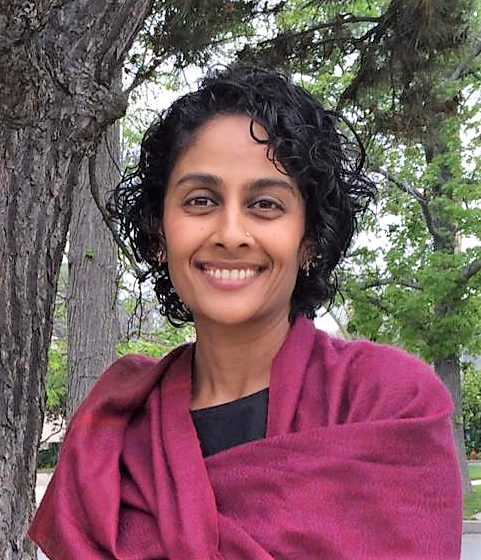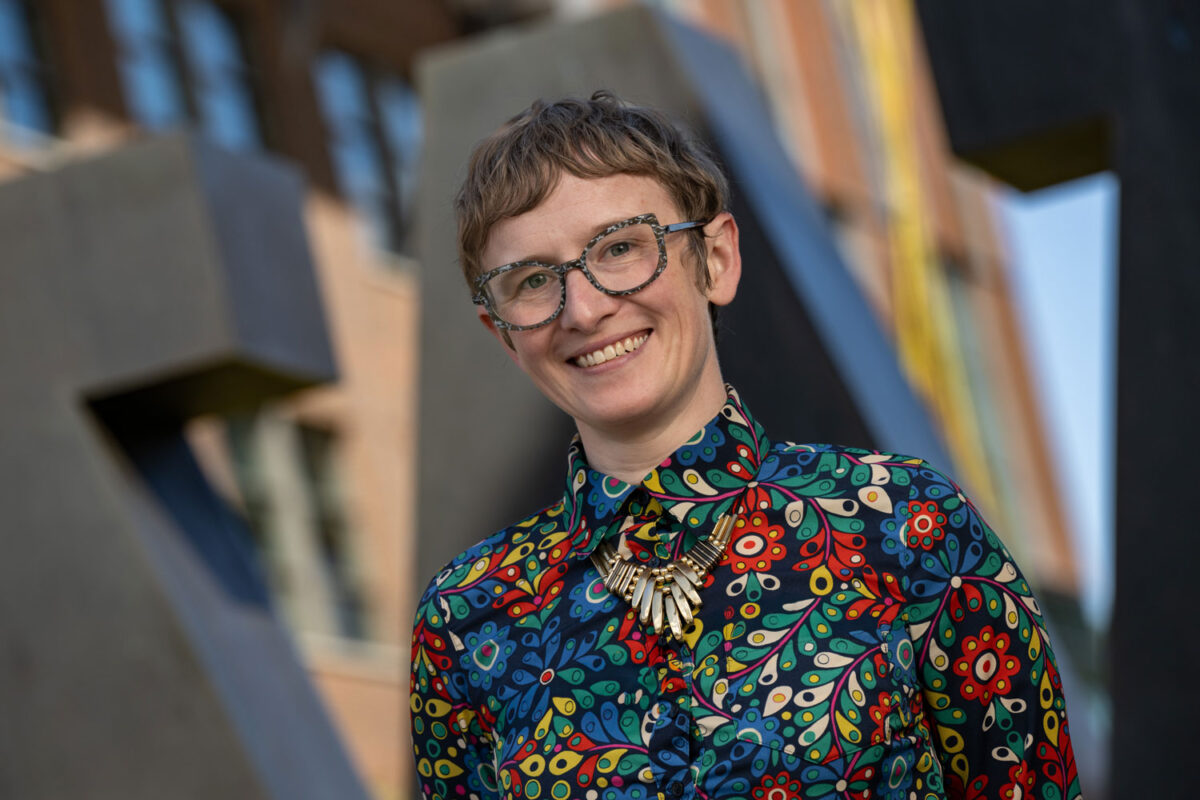
Dr. Brinda Sarathy, professor of environmental analysis at Pitzer College in Claremont, California, will succeed Dr. Bruce Burgett as dean of the School of Interdisciplinary Arts & Sciences at the University of Washington Bothell.
The University selected Sarathy in a national search that began last year. She will begin her job as dean and professor on July 1. Burgett, the inaugural dean of IAS, is returning to the faculty after 14 years of administrative service.
One of the largest schools at the University, IAS employs close to 100 full and part-time faculty and educates more than 1,000 students each year. IAS is at the core of the mission and vision for UW Bothell, said Dr. Sharon A. Jones, vice chancellor for Academic Affairs.
“When approaching this search, my primary goal was to find a leader whose background and values closely align with our cutting-edge School of Interdisciplinary Arts & Sciences so that we can further advance the transformational impact of the liberal arts,” Jones said. “Dr. Sarathy’s nuanced background in, practice with, and vision for interdisciplinary research and teaching, along with her committed advocacy for diversity, equity and inclusion strongly resonated with everyone who met with her during the search process.”
A career shift that resonates
Thriving in her job at Pitzer, where she had been for 13 years, Sarathy said she was not thinking of making a change until a friend drew her attention to the search underway at UW Bothell. She was struck by how closely the mission of IAS resonated with her work at Pitzer, a private, liberal arts college that is part of the Claremont consortium in Southern California.
The “values and commitment to social and environmental justice aligned with me,” Sarathy said.
“I was also impressed by Bothell’s strong emphasis on diversity, equity and inclusion, and its track record on social mobility for first-generation students,” she said. “That’s something I have become more and more mindful of at this point in my life, in terms of where I want to channel my time and energy.”
Coming from a college consortium, Sarathy also sees the benefits of UW Bothell being an integral part of the UW’s tri-campus community. “From all that I have seen so far, Bothell is a very special place. It excels in liberal arts pedagogy and interdisciplinary education, and it also draws strength from the resources and larger intellectual community of the University of Washington.”
Connecting with the community
Accepting the UW Bothell position was a leap of faith that she took without stepping foot on campus, Sarathy said. Days of interviews with the search committee and community members were conducted remotely due to the pandemic.
Despite limitations of the technology, she felt a strong sense of connection with the people she met. “The questions from staff, faculty and students were thoughtful, and I was able to engage in genuine conversations,” she said. “The search committee was tuned in to the needs of its community, and the process didn’t feel like just a top-down decision.”
Sarathy also has ties to the Northwest. Born in Canada, she spent two years in Vancouver, British Columbia, before starting graduate school. She has relatives living in Seattle. And she insists she loves rain.
Enmeshed in the environment
Sarathy said she grew up in a “bubble” in Saudi Arabia, where her father was working in the oil industry and her family lived in a largely American compound. She then went to a boarding school in south India, which was part of the local hill-station community and reliant on nearby forests for water and fuel. There, she became aware of the connection between political economy and natural resources. “I don’t think you can see the environment as separate from social relations,” she said. “They are co-constructed.”
At the University of California, Berkeley, Sarathy researched race and resource management for her doctorate in environmental science, policy and management. Her dissertation was supported by several research grants and gave rise to her 2012 book, “Pineros: Latino Labor and the Changing Face of Forestry in the Pacific Northwest.”
”When most people think about forest workers, the quintessential image is of Paul Bunyan — the rugged, flannel-wearing lumberjack. And yet, for over two decades, the vast majority of people working in Pacific Northwest forestry are Latino immigrants,” Sarathy said. “I was determined to make sure that their contributions and struggles were documented and recognized.”
Stop and smell the sage
At Pitzer, Sarathy also directed the Robert Redford Conservancy for Southern California Sustainability, which is a research and teaching center adjacent to a field station near the college. Part of her job involved converting a 1930s infirmary into modern classrooms and art spaces, no easy task given that the building had been shuttered for decades. Nevertheless, she jumped headlong into the work and was proud of the accolades it received, including LEED-platinum certification and several architectural awards.
As part of the renovation, Sarathy worked closely with Tongva elders whose Indigenous practices played a major role in designing the landscape of the Conservancy “to not just see something extracted but a place of food and life,” she said. “You shape the land, and it also shapes you.”
Sarathy worked with faculty and students at Pitzer to design the instructional and gallery spaces as well. Once the conservancy was open for classes, students and professors benefited from lower stress levels just by sitting under the native oaks and smelling the fragrance of sage.
“The conservancy allows for a certain kind of embodied cognition,” Sarathy said. “It is a transformative space.”
In pursuit of interdisciplinary research
Sarathy is currently on an American Council of Learned Societies fellowship, working on a book about the Stringfellow Acid Pits, California’s first Superfund site. She said her approach has been to look at how places are created in relation to one another, through flows of waste.
“It is helpful to understand how toxic places came about historically because similar logics of economic justification and technological hubris continue to play out today.
“Environmental problems can be so wicked and complex,” she added. “We need multiple and justice-oriented approaches to problem solving and need to be mindful of who makes the decisions — and who is most impacted.”
Sarathy also won a Fulbright-Nehru and Huntington Library fellowship this year. In the past, her research has been supported by grants from the Ford Foundation, Rural Sociological Society, the Morris K. Udall Foundation, and the Social Sciences and Humanities Research Council in Canada.
Recognizing contributions
Jones warmly thanked outgoing IAS Dean Burgett, who joined UW Bothell in 1999 as an associate professor. He became the acting IAS director in 2007 before transitioning to director in 2008 and then stepping into the role of founding dean in 2013.
“During his tenure, the school has become known for its robust culture of equity for faculty, staff and students,” said Jones. “Similarly, his mentorship of other deans has been instrumental to the growth and success of our young campus community.”
In making the new hire announcement, Jones also acknowledged the work of search firm Isaacson Miller and the search committee, particularly the chair, School of Business Dean Dr. Sandeep Krishnamurthy; Kathryn Rich, executive assistant who managed the leadership search in a virtual context; and inclusion advocate Dr. Wayne Au, professor in the School of Educational Studies.
Other members of the committee were: Kara Adams, director, community engagement; Dr. Raissa DeSmet, associate teaching professor, IAS; Dr. Silvia Ferriera, associate teaching professor, IAS; Dr. Ted Hiebert, professor, IAS; Ernest Kandilige, IAS Advisory Board; Jennifer Keene, administrator, IAS; Dr. Sara Maxwell, assistant professor, IAS; Eva Navarijo, director, undergraduate advising, IAS; Madison Nikfard, student, IAS; Dr. Keith Nitta, associate professor, IAS; Sarah Ramirez, student, IAS; and Dr. Wadiya Udell, professor, IAS.



